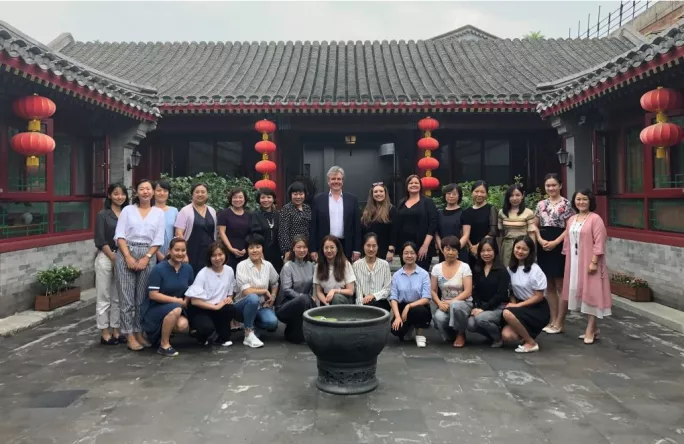- Home
- How the UK is supporting China’s education evolution
How the UK is supporting China’s education evolution

There are over half a million schools in China attended by almost 260 million pupils.
Overseeing this huge educational sprawl are 15 million teachers based everywhere from megacities in Shanghai and Beijing to rural towns and villages.
Furthermore, the huge social and economic growth of China in the past two decades or so has meant the need for its population to be more consistently educated by teachers with training in the latest pedagogical research - especially in early years settings.
Education in China: training the next generation
This is where the UK-China Culture and Education Cooperation Promotion Centre (UCEC) comes in.
Formed in May 2018 and headed up by CEO Neil Carmichael, former Conservative MP and member of the Commons Education Select Committee, the organisation is working to help share high-quality teaching research and pedagogical ideas in China, informed by UK best practice.
“China, of course, has many great teachers, but if we want to have great teaching in both early years and primary settings across the country then a new kind of teacher has to emerge,” says Mr Carmichael.
And not just a few of them, or thousands - but millions.
The Chinese Ministry of Education said in 2019 that around 3 million existing early years teachers will need CPD training in the next few years, and another 3 million new teachers will need to receive basic teaching education to become high-quality, qualified early years teachers.
In practice, this means ensuring that the new generation of teachers are better informed in the latest pedagogical research and can help the next generation of learners to have both the academic skills, and soft skills, to help the country continue to grow.

This is not just an issue reserved for the big mega-cities, but across the whole country.
“I went to the city of Datong in China and the challenge they had was how to move from being a coal mining city to a city with a focus on renewables and hi-tech production, and the answer, of course, is education,” adds Mr Carmichael.
Education is the key
To help tackle this issue, the UCEC is working with numerous organisations to help provide the right sort of teacher training development informed by best practice.
For example, by bringing together the UCL’s Centre for Teacher and Early Years Education - which Mr Carmichael was involved in setting up - and Beijing Normal University (BNU), the UCEC is aiming to help facilitate the development of a new type of teaching training, and teacher.
“In China, the universities play a pivotal role in delivery of education - not just training teachers, but in creating relationships with schools - so education policy permeates through universities, and so working with BNU is critical to the success of our operation,” said Mr Carmichael.
“This includes issues such as ‘how do you create the right kind of ambiance in a nursery school?’, ‘what are the best standards to maintain?’, ‘what is the definition of play?’, ‘how to deliver learning through play’ and more.”
This work will also include promoting cooperation between preschool and children’s education researchers to ensure joined-up thinking on key educational development issues and developing and reforming early years and primary education based on empirical research.
The power of experts
Furthermore, the UCEC has also established a small group of education experts - from Sir Michael Wilshaw, the former Ofsted chief inspector, to academics at the University of Nottingham and charities such as Save the Children - to provide insight on how to approach new challenges as and when they arise.
“They can help to comment on how we can develop things going forward and turning good ideas into best practice to ensure there is a holistic teaching and learning environment being created,” adds Mr Carmichael.
Creating this expert group helps, in part, to tap into the expertise needed to ensure that the UCEC can bring insights on all areas of education to its work in China.
This is something that Jessica Zhou, head of project advancement at the UCEC, says is seen as fundamental to the development of education in China so it focuses on key traits such as creativity and collaboration - not just academic learning.
“While early years is our main focus, one aspect of the project that we are also engaging in is looking at changing the curriculum so that it creates more well-rounded students,” she says.
“Things like domestic science [environmental studies], life skills and creative thinking - we want to help introduce that more into the Chinese school system.”
Family matters
Interestingly, a final area of work that the UCEC is focusing on goes beyond school and into the wider family dynamic - in a way mimicking the work of the Sure Start centres that lost central funding from 2010 onwards in the UK.
“It’s critical to work with parents from a very early age to help them - on everything from setting routines for getting children to bed on time, to looking after children with special needs,” says Mr Carmichael.
To this end, the UCEC is looking at helping to facilitate the creation of around 300 children’s centres across China that would provide support and help to parents for their children - from addressing parenting issues like how to get children to bed on time to helping those with special educational needs.
The scale of China means that they estimate 300 centres would support 30 million families - no small task.
To help with this work, the UCEC has partnered with Sharing Parenting to help bring the right materials and expertise to those who will oversee these centres to ensure they are able to deliver the right guidance to parents across the country.
This work has begun but has been hampered during the year, unsurprisingly.
“We have started looking at the sites for these 300 schools - obviously Covid has put us back on being able to do some of this work but we are still progressing and have already had some good practical insights into how we can do this working with Sharing Parenting in Shanghai,” says Mr Carmichael.
Overall, though, the demand for both these sort of centres - and the changes in teacher training to match more latest thinking on pedagogy coming from UK academics - underlines the strength of the UK education system on the world stage.
“Internationally we [British education] are well regarded…there is an appetite to understand what happens in the UK and how they [China] can replicate it,” says Mr Carmichael.
Dan Worth is senior editor at Tes
Keep reading for just £1 per month
You've reached your limit of free articles this month. Subscribe for £1 per month for three months and get:
- Unlimited access to all Tes magazine content
- Exclusive subscriber-only stories
- Award-winning email newsletters



